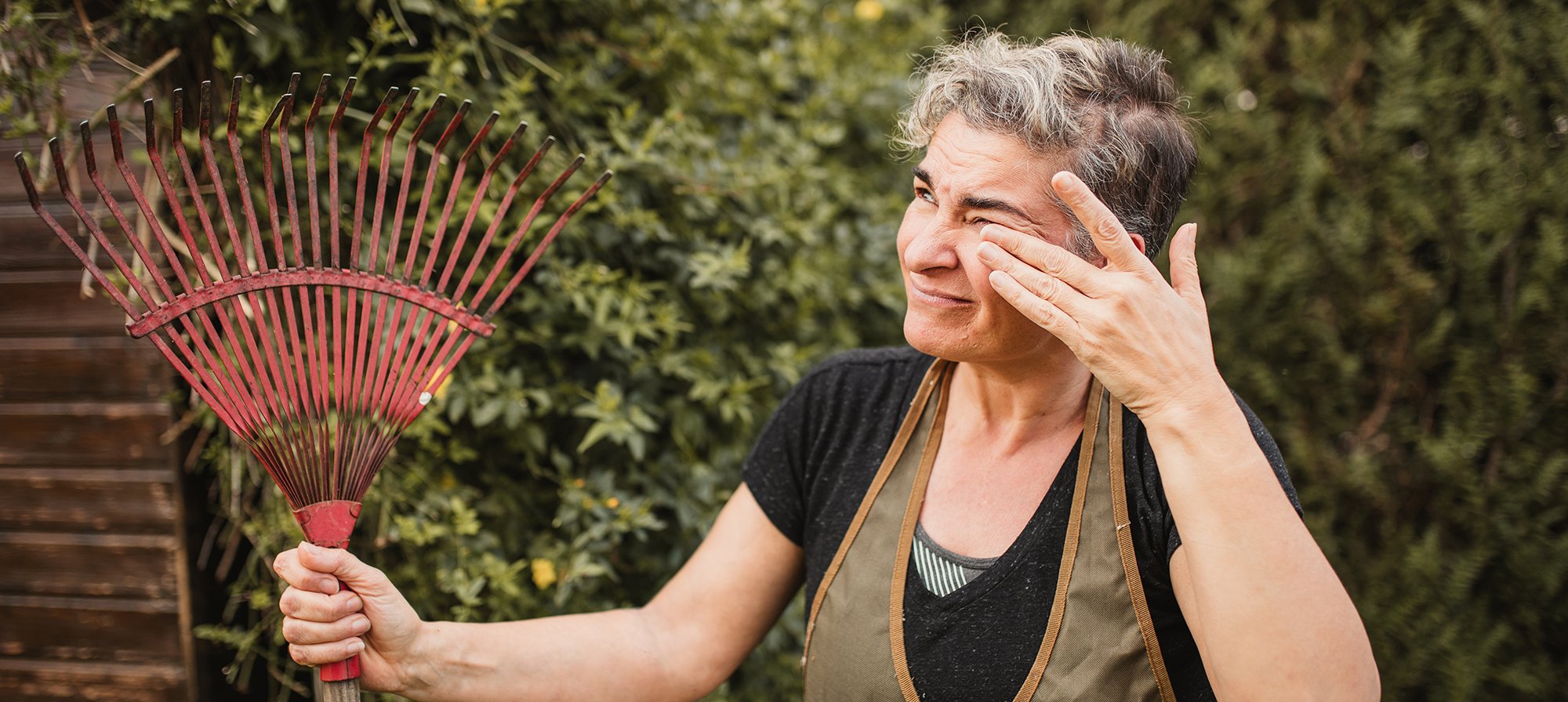Spring is in the air, along with a big spike in pollen. That’s bad news if you suffer from seasonal allergies. But these 14 self-care tips may help quell your symptoms.
Springtime—the much longed-for reprieve from the cold, dark days of winter. Temperatures are rising, flowers are blooming—and pollen counts are multiplying exponentially.
Unfortunately, for the 40 to 50 million Americans who suffer from seasonal allergies, spring’s high pollen counts bring on a host of unwanted symptoms. If you suffer from seasonal allergies, you’re likely all too familiar with the sneezing, itchy eyes, sinus pressure, and stuffy or runny nose. These symptoms can range in severity from slightly annoying to downright miserable.
Good news: You don’t have to simply suffer. You can start by talking with your doctor or allergist. They may suggest over-the-counter (OTC) or prescription allergy medications. If these help—and don’t cause too many side effects—that’s great.
But aside from meds, there are other steps you can take to help you avoid (or at least ease) your seasonal allergy symptoms. We take a closer look at each of these steps below, as well as understanding what an allergy is in the first place.
 What exactly is an allergy?
What exactly is an allergy?
For those who suffer from seasonal allergies, it all starts with exposure to a foreign substance. The inhalation of pollen from trees, weeds, or grass are common culprits.
Your immune system mistakenly reacts to this otherwise harmless substance (also called an allergen) as a threat and mounts a defense against it. Mast cells in your immune system release compounds, such as white blood cells, histamines, and others, to fight the invader.
This immune response is what can boost inflammation in your sinuses and lungs, along with sneezing; itchy eyes; and a stuffy or runny nose. The severity of these symptoms hinges on how sensitive the person is to the allergen. Although rarer, an allergic reaction can sometimes lead to asthma attacks; respiratory distress; and in some cases, even death.
Seasonal allergies that affect your upper respiratory tract aren’t the only kinds of allergies out there. Some substances that you touch can cause a rash or other skin reaction (think poison oak or ivy).
Other people are allergic to insect bites or stings, or to substances in certain foods or medications. Some of these allergic reactions can be severe or even life-threatening in some people. Learn the signs of anaphylaxis.
But for seasonal allergy sufferers, it’s the pollen that’s typically at play. Trying to avoid exposure to that pollen is a good first step to getting a handle on your allergies. Using a host of home remedies to ease symptoms is a helpful second step.

Minimize your exposure to pollen (and other allergens)
Common seasonal allergens include ragweed and pollen from grass, flowering trees, and weeds. But there are other common indoor allergens that can cause trouble all year long. These include dust mites, mold, cockroach droppings, and pet dander.
Taking these steps can help minimize your exposure to allergens:
1. Check pollen counts. There are any number of online tools you can use to check the pollen counts in your zip code. If the count is exceptionally high, try to stay indoors if you can. If you have to go outside, wear sunglasses to help protect your eyes from pollen and a NIOSH-approved N95 mask to protect your nose.
2. Close windows and doors. Keep the pollen outside as much as you can during allergy season. Pollen counts tend to go up in spring, summer, and fall.
3. Skip the yardwork. Mowing the lawn or pulling weeds during allergy season may cause a flare-up. Avoid this chore if you can. Wear an N95 mask if you can’t.
4. Use HEPA filters (high-efficiency particulate air filters). These are the recommended choice of filters to use in your AC and heating systems. They are thought to do the best job at cleaning pollen and other allergens from indoor air. Follow manufacturer’s instructions for cleaning and/or replacing them. You might also think about buying extra HEPA air purifiers for your home.
5. Shower and shampoo after you’ve been outside—and even when you’ve been inside all day. Doing this right before bed is a good way to keep pollen, dust mites, and pet dander off your pillow and bedclothes at night.
6. Wash clothes and bedding often. Wash your clothes in hot water after going outside. And wash all your bedding—such as blankets, bedspreads, sheets, and pillowcases—in hot water (130º F) at least once a week. Avoid pillows or comforters made from wool or feathers. Choose man-made fabrics instead.
7. Wear an N95 mask when vacuuming, sweeping, or dusting. Or, better yet, have someone else do these chores if you can. Use a HEPA filter in your vacuum cleaner.
8. Tame indoor allergens, too. Pet dander, mold, dust mites, and cockroach droppings can also cause allergic reactions. Click here for tips on how to allergy-proof your home from these kinds of allergens.

Do-it-yourself remedies for allergy relief
If your allergy symptoms have already kicked up, take a multi-faceted approach to ease them. That means not just relying on just one kind of treatment or remedy, but rather a combination of them until you find relief.
You may be able to quell your symptoms with home remedies alone. Or you may need to take allergy medications and employ some of the home remedies below. Talk with your doctor or an allergist about both approaches.
One vital thing to keep in mind: If you ever have a severe allergic reaction and have trouble breathing, seek medical treatment right away or call 911. In some people with asthma, allergies may trigger an asthma attack. Make sure to talk with your doctor about any medications you may need to prevent that from happening.
In the meantime, some findings suggest that the natural remedies below can help ease some seasonal allergies symptoms:
9. Tweaks to your food plan. While more research is needed to pinpoint exactly how the foods you eat can affect seasonal allergies, some studies suggest that the following eating habits may help ease symptoms:
- A diverse, nutrient-rich diet. More research is needed on whether eating specific foods will boost your immunity or prevent allergies. However, it can help to eat a varied diet of nutrient-rich foods. This kind of healthy food plan can help ensure you get the full range of vitamins and minerals needed to keep your immune system strong. And that in turn may help lessen allergy symptoms.
Try to eat plenty of colorful, fresh vegetables and fruits; whole grains; olive oil; nuts and seeds; beans; fish; and smaller amounts of animal protein. Limit or avoid alcohol, fried foods, ultra-processed foods, and added sugar, as these can all boost inflammation. - Anti-inflammatory diet. One hallmark symptom of an allergic reaction is increased inflammation. Eating a nutrient-dense diet like the one described just above is high in many of the vitamins, minerals, and antioxidants thought to help keep inflammation in check.
Beyond that, make sure to eat plenty of citrus, such as oranges and pineapples, which are high in vitamin C. This vitamin has been shown to help lessen inflammation. Vitamin K is also thought to help. Broccoli, spinach, lettuce, kale, and cabbage are all high in vitamin K. Learn about other foods that may help lower inflammation. - Organic foods. More research is needed, but a handful of studies suggest that eating organic foods instead of conventional foods, may lower your sensitivity to common allergens.
- Foods with prebiotics and probiotics. Research suggests that when your gut flora is unhealthy or out of balance, your risk for nasal allergies may be higher. Eating foods rich in probiotics and prebiotics can help support a healthy gut (microbiome).
Probiotics are friendly bacteria found in fermented foods. Prebiotics are certain types of fiber found in fruits and veggies that feed the good bacteria in your gut. Getting foods with both of these compounds is key to a healthy gut and may help ease nasal allergies. - Foods and herbs that act as natural antihistamines. While a lot more research is needed, some studies have found that certain herbs, such as stinging nettle and butterbur, can ease symptoms by lowering the production of histamine. Other findings suggest that foods high in the antioxidant quercetin (asparagus, dill, oregano, spinach, kale) may also dampen histamine production.
Talk with your doctor before taking any herbal supplements. Many of them have side effects and might also interact with other medications you’re taking. - Hydration. Research suggests that being dehydrated may boost the production of histamine, which can trigger or worsen allergy symptoms. Make sure to sip water throughout the day. And add plenty of juicy fruits, veggies, soups, and tea to your food plan.
10. Nasal sprays and irrigation. Over-the-counter saline sprays can help moisten nasal passages and may relieve congestion. Nasal irrigation with various devices, including a neti pot, can flush out pollen, dust, mucous, and bacteria.
NOTE: It’s imperative that you talk with your doctor or allergist to get guidance on the safe and proper use of nasal irrigation devices. Used incorrectly, they may cause more harm than good. For example, using tap water versus boiled, sterile, or distilled water can cause severe bacterial infections of your upper airways.
11. Aromatherapy. Researchers have explored the various health benefits of essential plant oils for some time, including the impact of certain oils on nasal seasonal allergies. More research is needed, but some findings suggest plant oils may help. One study found that inhaling the aroma of sandalwood and geranium oils improved nasal congestion and fatigue in a group of allergy sufferers.
Keep in mind that essential oils are strong and can interact with other meds or cause side effects. Also, aromatherapy as an industry is not regulated by the FDA and licensing is not required to practice it. If you decide to try it, work with a licensed acupuncturist or nurse trained in its use.
12. Acupuncture. This ancient form of Chinese medicine entails placing hair-thin needles along certain pathways in the body to improve the flow of energy—or qi (pronounced “chee”)—throughout the body. This in turn is thought to enhance good health and mitigate certain diseases. Some research findings suggest that acupuncture may decrease the episodes of seasonal allergies and also lessen the symptoms.
13. Allergy tests and allergy shots (immunotherapy). Talk with your doctor or allergist about getting a skin prick test to determine which allergens are causing your reactions. Your doctor may then suggest you get a series of shots containing small amounts of those allergens in order to desensitize your immune system to them. While this is not a DIY remedy, this kind of treatment may help you get a better handle on your seasonal allergies.
14. Adopt healthy habits to bolster your immune system. A strong immune system may help mitigate seasonal allergies. Getting ample sleep, eating a healthy diet, exercising regularly, and managing stress are just a few of the ways you can strengthen your immune system.
In recent years, allergy seasons have been starting earlier and lasting longer. If you suffer, even mildly, from spring, summer, and/or fall seasonal allergies, work closely with your doctor or allergist. And use these tips and remedies to get better relief and get back to living life to the fullest.

Not a Silver&Fit® member? Learn more about everything the program has to offer, including more helpful healthy living tips like this, here on our website.
This information is not intended to take the place of regular medical care or advice. Please check with your doctor before using this information or beginning any self-care program. Images used for this article do not depict any members of the Silver&Fit Program.
References
American College of Allergies, Asthma, and Immunology. (n.d.). Allergic conditions. https://acaai.org/allergies/allergic-conditions/
Asthma and Allergy Foundation of America. (n.d.). Allergy facts. https://aafa.org/allergies/allergy-facts/
Asthma and Allergy Foundation of America. (n.d.). Climate change and health. https://aafa.org/asthma-allergy-research/our-research/climate-health/
Asthma and Allergy Foundation of America. (n.d.). How can I control indoor allergens and improve indoor air quality? https://aafa.org/allergies/prevent-allergies/control-indoor-allergens/
Asthma and Allergy Foundation of America. (n.d.). Allergy treatments: What are the best treatments for allergies? https://aafa.org/allergies/allergy-treatments/
Asthma and Allergy Foundation of America. (n.d.). Grass pollen allergy. https://aafa.org/allergies/types-of-allergies/pollen-allergy/grass-pollen-allergy/
Bakhshaee, M., Mohammad Pour, A. H., Esmaeili, M., Jabbari Azad, F., Alipour Talesh, G., Salehi, M., & Noorollahian Mohajer, M. (2017). Efficacy of supportive therapy of allergic rhinitis by stinging nettle (Urtica dioica) root extract: A randomized, double-blind, placebo-controlled, clinical trial. Iranian Journal of Pharmaceutical Research (IJPR), 16(Suppl), 112–118. https://pubmed.ncbi.nlm.nih.gov/29844782/
Better Health Channel. (2022, May 16). Allergies explained. https://www.betterhealth.vic.gov.au/health/conditionsandtreatments/allergies
Choi, S. Y., & Park, K. (2016, March 13). Effect of inhalation of aromatherapy oil on patients with perennial allergic rhinitis: A randomized controlled trial. Evidence-Based Complementary and Alternative Medicine: eCAM, 2016, 7896081. https://doi.org/10.1155/2016/7896081
Cleveland Clinic. (2023, August 18). Gut microbiome. https://my.clevelandclinic.org/health/body/25201-gut-microbiome
Cleveland Clinic. (2022, April 25). Home remedies for seasonal allergies. https://health.clevelandclinic.org/natural-remedies-for-seasonal-allergies
Cristofori, F., Dargenio, V. N., Dargenio, C., Miniello, V. L., Barone, M., & Francavilla, R. (2021, February 26). Anti-Inflammatory and immunomodulatory effects of probiotics in gut inflammation: A door to the body. Frontiers in Immunology, 12, 578386. https://doi.org/10.3389/fimmu.2021.578386
Dabeek, W. M., & Marra, M. V. (2019, September 25). Dietary quercetin and kaempferol: Bioavailability and potential cardiovascular-related bioactivity in humans. Nutrients, 11(10), 2288. https://doi.org/10.3390/nu11102288
Güvenç, I. A., Muluk, N. B., Mutlu, F. Ş., Eşki, E., Altıntoprak, N., Oktemer, T., & Cingi, C. (2016, September 1). Do probiotics have a role in the treatment of allergic rhinitis? A comprehensive systematic review and meta-analysis. American Journal of Rhinology & Allergy, 30(5), 157–175. https://doi.org/10.2500/ajra.2016.30.4354
Harvard Health Publishing. (2022, November 14). Probiotics and prebiotics: What’s really important. https://www.health.harvard.edu/nutrition/are-you-getting-essential-nutrients-from-your-diet
Harvard T. H. Chan School of Public Health. (2021, October). Diet review: Anti-inflammatory diet. https://www.hsph.harvard.edu/nutritionsource/healthy-weight/diet-reviews/anti-inflammatory-diet/
Harvard T. H. Chan School of Public Health. (n.d.). Nutrition and immunity. https://www.hsph.harvard.edu/nutritionsource/nutrition-and-immunity
Harvard T. H. Chan School of Public Health. (n.d.). The microbiome. https://www.hsph.harvard.edu/nutritionsource/microbiome/
HelpGuide.org. (2023, March 1). Organic foods: What you need to know. https://www.helpguide.org/articles/healthy-eating/organic-foods.htm
Jafarinia, M., Sadat Hosseini, M., Kasiri, N., Fazel, N., Fathi, F., Ganjalikhani Hakemi, M., & Eskandari, N. (2020, May 14). Quercetin with the potential effect on allergic diseases. Allergy, Asthma, and Clinical immunology: Official Journal of the Canadian Society of Allergy and Clinical Immunology, 16, 36. https://doi.org/10.1186/s13223-020-00434-0
Li, J., Fang, F., Mei, M., & Wu, D. (2023, February). The gut microbiome and allergic rhinitis; refocusing on the role of probiotics as a treatment option. European Archives of Oto-rhino-Laryngology: Official Journal of the European Federation of Oto-Rhino-Laryngological Societies (EUFOS): Affiliated with the German Society for Oto-Rhino-Laryngology - Head and Neck Surgery, 280(2), 511–517. https://doi.org/10.1007/s00405-022-07694-z
Maleki, S. J., Crespo, J. F., & Cabanillas, B. (2019, November 30). Anti-inflammatory effects of flavonoids. Food Chemistry, 299, 125124. https://doi.org/10.1016/j.foodchem.2019.125124
Mayo Clinic. (2022, March 5). Allergy medications: Know your options. https://www.mayoclinic.org/diseases-conditions/allergies/in-depth/allergy-medications/art-20047403
Mayo Clinic. (2022, December 22). Allergy proof your home. https://www.mayoclinic.org/diseases-conditions/allergies/in-depth/allergy/art-20049365
Mayo Clinic. (2022, January 26). Allergy shots. https://www.mayoclinic.org/tests-procedures/allergy-shots/about/pac-20392876
Mayo Clinic. (2021, October 2). Anaphylaxis. https://www.mayoclinic.org/diseases-conditions/anaphylaxis/symptoms-causes/syc-20351468
Mayo Clinic. (2022, April 27). Seasonal allergies: Nip them in the bud. https://www.mayoclinic.org/diseases-conditions/hay-fever/in-depth/seasonal-allergies/art-20048343
National Center for Complementary and Integrative Health. (n.d.) Butterbur. https://www.nccih.nih.gov/health/butterbur
Rakha, A., Umar, N., Rabail, R., Butt, M. S., Kieliszek, M., Hassoun, A., & Aadil, R. M. (2022, October 31). Anti-inflammatory and anti-allergic potential of dietary flavonoids: A review. Biomedicine & Pharmacotherapy = Biomedecine & Pharmacotherapie, 156, 113945. https://doi.org/10.1016/j.biopha.2022.113945
Skoczylas, D., Gujski, M., Bojar, I., & Raciborski, F. (2020, September 11). Importance of food allergy and food intolerance in allergic multimorbidity. Annals of Agricultural and Environmental Medicine : AAEM, 27(3), 413–417. https://doi.org/10.26444/aaem/123107
Song, T. T., Jing, X. H., Guo, W., Han, G. X., Du, S., & Zhao, J. P. (2023, February 12). [Acupuncture for the prevention of moderate to severe seasonal allergic rhinitis: A randomized, controlled trial. Zhongguo Zhen Jiu, 43(2), 123–127. https://pubmed.ncbi.nlm.nih.gov/36808503/
United States Food and Drug Administration (FDA). (n.d.). Is rinsing your sinuses with neti pots safe? https://www.fda.gov/consumers/consumer-updates/rinsing-your-sinuses-neti-pots-safe
University of California, Davis. (2023, March 27). Tips to reduce seasonal allergy symptoms and treatment options to help. https://health.ucdavis.edu/blog/cultivating-health/tips-to-reduce-seasonal-allergy-symptoms-and-treatment-options-to-help/2023/03
Vigar, V., Myers, S., Oliver, C., Arellano, J., Robinson, S., & Leifert, C. (2020, January). A systematic review of organic versus conventional food consumption: Is there a measurable benefit on Human health? Nutrients, 12(1), 7. https://doi.org/10.3390/nu12010007
Yamada, S., Shirai, M., Inaba, Y., & Takara, T. (2022). Effects of repeated oral intake of a quercetin-containing supplement on allergic reaction: a randomized, placebo-controlled, double-blind parallel-group study. European Review for Medical and Pharmacological Sciences, 26(12), 4331–4345. https://doi.org/10.26355/eurrev_202206_29072
This article was written by Gail Olson, edited by Kim Reynolds, and clinically reviewed by Elizabeth Thompson, MPH, RDN, on February 14, 2024.





